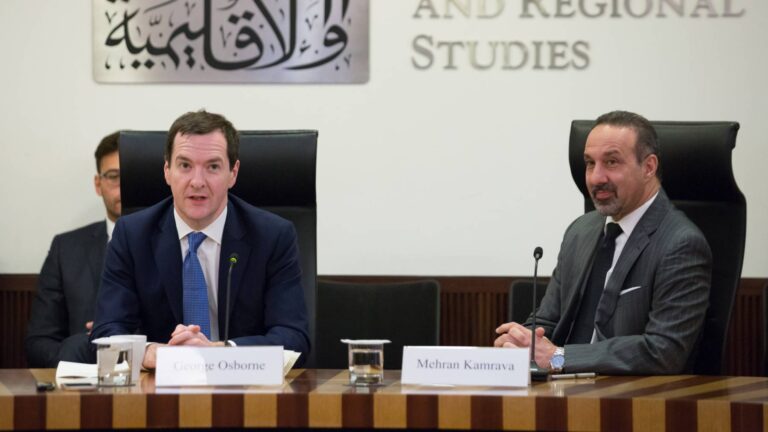American Studies, Distingushed Lectures, Regional Studies
A Conversation with George Osborne

On March 28, 2018, George Osborne, former British Conservative Party politician and current editor of the London Evening Standard, was invited by CIRS to deliver a Focused Discussion in which he spoke to Georgetown University-Qatar faculty, staff, and students about the increasingly challenging state of international politics. He began the conversation by noting that “there is quite a profound pessimism about the direction that the world is heading in.”
There are several reasons for this general distrust in international politics, including “an erratic president” in the United States, an aggressively expansionist Russia reaching into Ukraine and Georgia, the uncertainties associated with Brexit, and a progressively fragmenting Europe in which the far right is coming to power in many countries. “The EU, NATO, the IMF—all of these institutions created in the aftermath of Second World War seem like they are struggling and like they are failing,” he said. In the Middle East, the problems continue, with the Syrian conflict looming large, and fears of an escalation in hostilities between Iran and Saudi Arabia.
“All this makes the world look very gloomy,” Osborne said, but, despite the ongoing negativity, he offered “three reasons to be cheerful” regarding the current political climate. The first is that, despite his inflammatory rhetoric, President Trump has not made substantial policy changes, and has taken a surprisingly orthodox stance when it comes to the Middle East, even more so that of Bush and Obama before him. The US president has spoken of “fairly alarming policies, but these did not turn out to be that big of a threat,” Osborne argued.
“All this makes the world look very gloomy.”
Even though Osborne noted that “I did everything in my power to stop Brexit,” he argued that a second reason for optimism is that despite Britain’s exit from the European Union, it will continue to be intimately involved with the EU, and will not be completely isolated.
The third and final reason to be cheerful, according to Osborne, is the steady but measured rise of China. Although the country’s ascendance has caused some governments to be wary, he noted that “China is keen on asserting its rights, but it is also keen on doing so through international channels.” China may have firm nationalistic aims, but not at the cost of peace. “One thing that I learned from China in many years is that, above all, they are interested in stability,” Osborne said.
Osborne ended with some statistics to support his optimistic conclusions. Despite the current state of world affairs, in 2017, he said, fewer people in the world died of hunger, disease, or violence as compared to any previous year in human history. Even with the many problems, conflicts, and challenges we face today, “something is working,” he concluded.
Article by Khansa Maria, CIRS Student Assistant
George Osborne was Member of Parliament (MP) for Tatton from 2001 to 2017. He served as Chancellor of the Exchequer under Prime Minister David Cameron from 2010 to 2016, during which time he also served on the National Security Council. From 2015 to 2016, he served as Britain’s First Secretary of State. He is Chair of the Northern Powerhouse Partnership, a not-for-profit organization he created to promote economic development in the North of England.